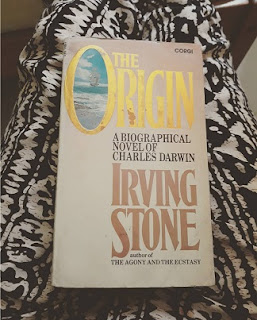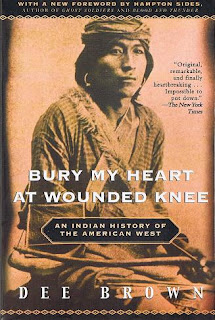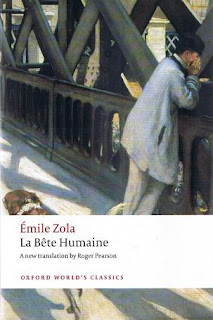I have just
finished a wonderful book, of which I still need time to digest: Irving Stone's
The Origin—a historical account on
Charles Darwin. As always with great books, it'd take me much time and efforts
to review. On the other hand, my head is full of it and I was eager to write
something. Several weeks ago I saw a meme called 6 Degree of Separation (hosted by Kathy), and thought: why
not working on one with The Origin?
This book has reminded me of many books as I read it, so I think I would work
on two different routes of separations, starting both with The Origin. Let's see where it gets! And to make it more interesting,
can you guess the relation of each separation only by the title (without
reading my explanation)?
From The Origin to The Lord of the Rings
The Origin
Irving Stone has done a tremendous research on the life and work of Charles
Darwin, including the reason why he, in the first place, had courageously
written and published On The Origin of Species despite his fears of strong
rejection and public accusation of blasphemy: it's because he longed to tell the truth!
The truth was also Émile Zola's
reason when he heroically published an open letter to the president of France:
The Dreyfus Affair: J'Accuse!
It was Zola's fight against the injustice imposed upon Alfred Dreyfus—a Jewish officer accused of
committing treason.
Robert Harris has written a thorough account of the Dreyfus Case in his historical novel:
The book made it clearly understood that the biggest crime behind Dreyfus Case
was racism.
The real event of racism in a higher
level could also be found in this history book:
The book retells the history of injustice, genocide, and, at the end, massacre
of the native Indian in American
West.
The native Indian was also picked by
a German writer who has never been to America but could tell the story so
vividly: Karl May with his masterpiece:
Winnetou (series)
One thing I admired from the series is the true
friendship between Winnetou and Old Shatterhand, which overcame their
differences—in culture, race, beliefs.
The same true friendship over differences I have
also encountered in a fellowship from the other "world" in:
One of my favorite things from this least favorite book of mine is the
friendship of Legolas, the elf, and Gimly, the dwarf. Theirs is nothing compared
to Winnetou-Old Shatterhand's, but still... how they could be brothers in spite of their
differences, is what we all must keep in world present world full of hatred; is
it not?
And there, the first route of separations must end. What do you think? Which
part is your favorite? Or do you need a more encouraging piece? Keep reading,
then...
From The Origin to La Bête Humaine
The Origin
The easiest path is, of course, that which lead to Charles Darwin's magnum opus:
On the Origin of Species
Darwin's "evolution" was an unprecedented theory amidst the
conventional Christian views (that God created living creatures as a whole and
unchanged), thus it triggered more disputes
between the Church and Naturalists (scientists).
The similar conflict (albeit only in the person of Abbe Mouret) also appears in a
book of a naturalist in literary world: Émile Zola:
The priest was torn between the rigidness of the Church and the fertility of
the Nature. These conflicts eventually led him to committing the sin.
Speaking of sin, reminded me of The Sin
which is discussed in:
This is also a magnum opus; of a fiction writer. Besides sin, it also
talks about good vs evil--our freedom
of choice (or Timshel). This led me to think about...
Remember a bunch of teenagers who was stranded on an uninhabited island? Isn't
there one boy who was 'forced' to choose the path of good vs evil, finally chose to keep his common sense, while
the others succumbed to their "beast"
within or....
Zola highlighted the importance of controlling our beast within in this beautiful yet provoking novel.
And so, that's the end of the second route of the separations.
Tell me, which route do you like most?












They both work, but I like the second one even more so b/c it seems like a faster, smoother connection.
ReplyDeleteA friend of mine gave me two books by Irving Stone, and she raved about his style of writing; so I'm looking forward to one day reading them.
This is a lot of fun. I'd do it, too, if I had time because it seems like it would require some thought, which lately I feel like I do not have. :(
Irving Stone's are all fabulous I've read three of them: Lust for Life (on Van Gogh), The Agony and the Ecstasy (on Michelangelo), and The Origin. And I can say I loved them all.
DeleteRuth, do the meme just for fun. You can find anything related to one book; it can be its title, or the author's country, for example. Have fun! ^_^